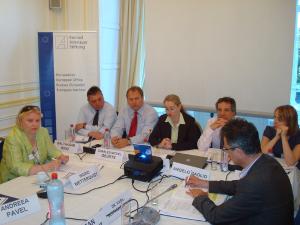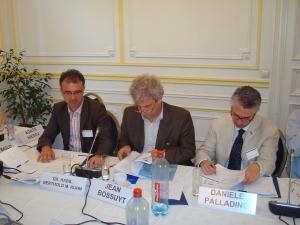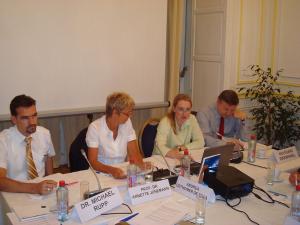Fachkonferenz
Details
At a time when democratisation processes worldwide experience a backlash and democratic systems seem to loose their attractiveness not only for ruling elites but also for parts of the local populations drifting into absolute poverty, it has been a pertinent initiative to have a critical look at the approach that has been used by the European Union for democracy promotion in its external relations so far.
Although the initial starting point by the Czech presidency to achieve a European Consensus for Democracy has become an EU Agenda for Action on Democracy Support in EU External Relations, we all agree that it has been an exercise overdue for a long time.
In the past, democracy promotion by the EU has focused at large on human and political rights protection, support to institutional structures, on elections and here particularly on election observation. Political actors have rarely been target groups although they are the most important elements for a consolidation of democratic structures.
Our experience from the field has shown that particularly in developing countries or even young democracies, seldom democracies have been established with parties serving as transmitters of interests and needs between government and the population. What we find are quite often personalised political structures that easily take on populist connotations. Counter-balances within the ruling party do not exist and intra-party democracy quite often remains a remote concept.
As it stands, the EU Agenda for Action on Democracy Support is an excellent initiative. Considering the 19 different instruments, programmes and initiatives which have been identified by the Council Secretariat and Commission in their working paper, and which are currently at disposal for democracy promotion of the EU, it is certainly time to aim for more coherence, coordination and complementarity and to enhance by this not only the efficiency but also the impact of democracy promotion in external relations.
However, democracy promotion is more than only the protection of human rights and civil liberties and their advocates. The essential element of participation and representation should not only be interpreted and reduced to aspects of gender equality or inclusion of otherwise marginalised groups. The effective participation and representation of citizens needs political parties who are linked to and embedded in the respective societies. Parties which are able to develop local structures, provide political alternatives, adhere to intra-party democracy and turn from personalised associations into core institutions for democracy in a country. Here, external assistance is much needed and should not be neglected in any endeavour to promote democracy.
This expert roundtable aims to take stock of what has been done so far for democracy promotion in the sense of the conceptual approach highlighted above. It strives to identify fields of engagement, tools and strategies that will enable the operationalisation of the European Agenda for democracy support. This roundtable will be a kick-off for further expert meanings in order to accompany the reform processes and dialogues taking place on Union level.






